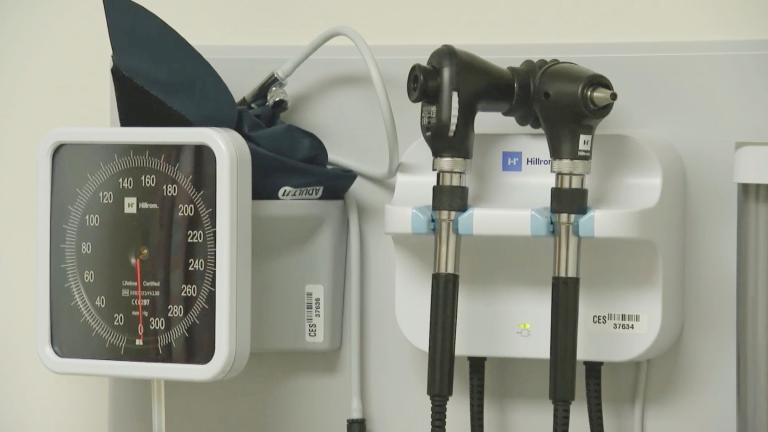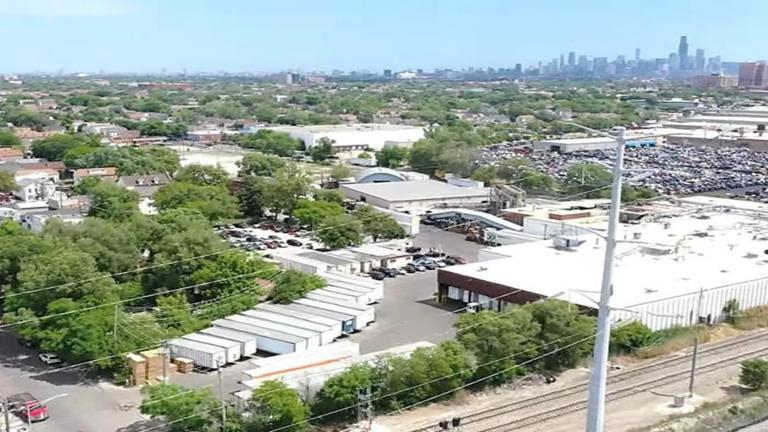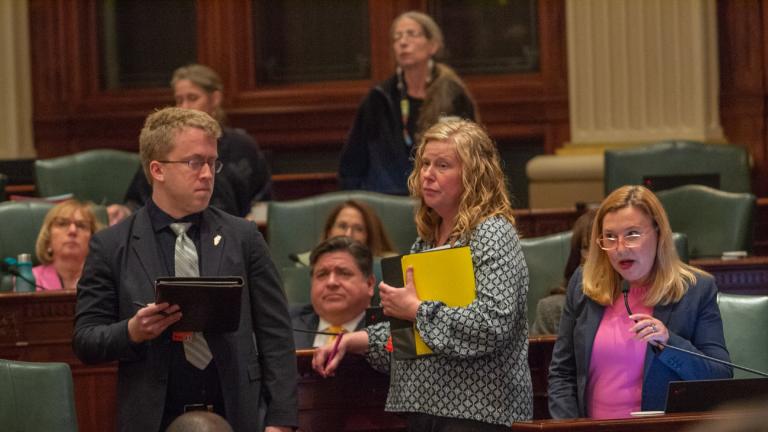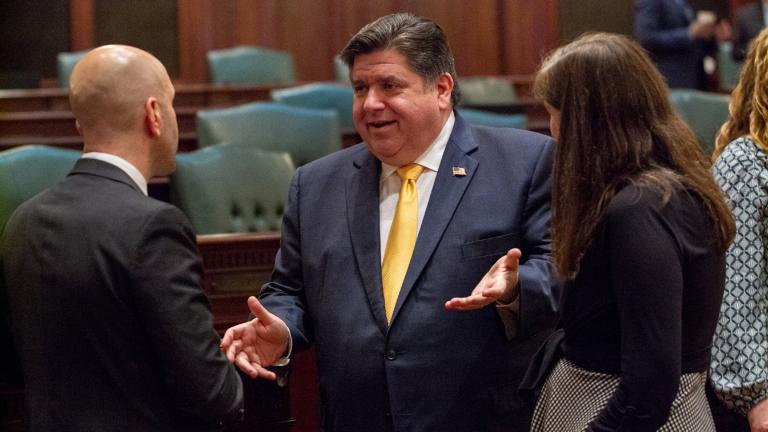Illinois Democrats used their supermajorities in the General Assembly to full advantage this weekend as their spring session reeled toward an end, pushing through a progressive agenda, an on-time $42 billion budget with no tax or fee hikes on individuals, and legislative maps that could help the party continue to secure its in-state dominance.
Even with complete control of the levers of power in Springfield — and despite working into the wee hours of Tuesday morning — policy fissures between the chambers meant lawmakers didn’t fully complete their work in time to adjourn as scheduled Monday, leaving hanging high-profile issues like an elected board for Chicago Public Schools, repairing issues with the state’s gun licensing process and a massive energy package.
UPDATE: Illinois Senate Passes Chicago Elected School Board Bill
The end-of-May deadline is constitutionally designed to prompt action by the legislature, given that starting June 1 it takes three-fifths of the members of both chambers, rather than a simple majority, to pass any measure that takes immediate effect. Since Democrats have more than enough members to clear that threshold, the stroke-of-midnight May to June deadline no longer carries the same Cinderella-style incentive.
At 3 a.m. Tuesday, the state Senate announced plans to resume its work seven hours later.
Members of the Illinois House, meanwhile, were dismissed to go home around 2:30 a.m., but they were put on notice by Illinois House Speaker Emanuel “Chris” Welch, who said, “We are hoping to return sooner (to Springfield) than later” to take on the energy bill, the fate of which flickered on and off through the session’s final hours.
“I think we had a very successful session. I think this is probably one of the most successful sessions around here in a long time,” Welch said.
As for the unfinished business: “You’ve heard me say this time and time again. Diversity is the strength of our state. And diversity is the strength of the House Democratic Caucus and the Senate Democratic Caucus,” Welch said. “We’re not going to always agree. Sometimes we disagree. And that’s because of our great diversity. And we have to be proud of that.”
It was Welch’s first session as speaker, and the first since the mid-1990s that the House hasn’t been presided over by his predecessor, former Illinois House Speaker Michael Madigan.
Madigan’s presence was nonetheless felt in the capitol. Last week his longtime chief of staff, Tim Mapes, was indicted for obstruction of justice and perjury in relation to an ongoing investigation targeted at Madigan that has already snared others in the former speaker’s inner circle for their alleged roles in a long-running bribery scheme, the details of which Commonwealth Edison admitted to in a deferred prosecution agreement last summer.
The scandal has left ComEd and its parent company, Exelon, without its former political cache, and raised a specter over energy negotiations.
It’s due in part to Madigan’s shrewd political machinations that Democrats were able to grow their ranks to supermajority status.
Welch promised bipartisan cooperation and a “new day” in Springfield when he was elected in January as Illinois’ first Black House speaker.
Republicans say little has changed under Welch’s nearly six-month tenure.
“We’ve talked many times in this chamber about it being a new day. The only new day is going to happen in five minutes when the clock strikes midnight, because what we’re seeing on this floor is the same dark, old days that we’ve struggled under for years,” Republican Rep. Tom Demmer of Dixon said during a late-night budget debate.
Gov. J.B. Pritzker, who will be the final arbiter of the budget and scores of measures that will soon be forwarded to his desk for action, was also in Springfield for the busy end-of-session scrum but stayed out of public view. He has had no public appearances since May 19; his press office has said the governor has been steadily meeting with legislators in private.
While Welch gleefully ticked off the legislation approved during the session, the Illinois Chamber of Commerce, which represents Illinois businesses, said the state is going to pay for its choices to get rid of corporate tax breaks and other actions with a loss of job opportunities.
“These tax increases, when combined with extraordinarily punitive changes to our civil liability system, increased regulation, and a potential labor drafted rewrite to the Illinois Constitution, makes the 102nd General Assembly the worst for job creation in a generation,” the chamber said in a statement.
Federal COVID-19 relief money and healthier-than-anticipated income and sales tax revenues helped to shore up Illinois’ budget, to the point that its crafters hope credit ratings agencies will move Illinois beyond its single notch above junk status.
Illinois’ next budget (outlined in Senate Bill 2800 and Senate Bill 927) is set to spend $42.2 billion in general funds for the 2022 fiscal year that begins in July.
That covers the state’s required payment into government pension systems, paying off nearly $3 billion in outstanding non-pension debt, a $350 million annual boost to schools, and more than $100 million to support affordable housing, according to a grant program in just-passed House Bill 2621.
Chair of the Senate Appropriations Committee Sen. Elgie Sims, D-Chicago, said the budget is balanced while also taking care of people.
“It puts us on the path for fiscal responsibility into a brighter day for Illinois,” Sims said. “This budget absolutely funds our priorities because we are fighting for individuals who cannot fight for themselves.”
Sponsoring Rep. Greg Harris, D-Chicago, said the measure spends a $2.5 billion tranche of the roughly $8 billion that Illinois will receive in a lump sum via the American Rescue Plan Act, or ARPA; $1 billion next year will go toward infrastructure projects, and $1.5 billion toward community coronavirus-related needs, including support for the bruised hospitality industry.
The federal coronavirus relief is supposed to stretch over four years, and the feds haven’t yet released final guidance on how the money can be spent.
Harris said Democratic lawmakers will be strategic, and will spend the summer discussing how to spend the remaining $5.5 billion of ARPA funding.
“We’re beginning to turn the corner, we’re beginning to stabilize,” Harris said. “We’re trying to address very carefully and strategically needs we see out there.”
Even legislators had little time to fully examine the spending plan.
The initial version of a 704-page spending measure was first filed at 1:30 a.m. Monday; that proposal was ultimately modified late at night, mere minutes before it was called for a House vote.
The measure passed on party lines, with Democrats’ support and Republicans in opposition.
“This budget is an unparalleled spending spree of epic proportions. When is enough enough?” Said Sen. Chapin Rose, R-Mahomet. “You said this reflects your priorities. It doesn’t reflect ours.”
Rose said the budget does nothing to close a growing deficit at the fund that covers unemployment, even as Democratic constitutional officers see their budgets grow and legislators will get a bump in pay.
Local governments’ share of state income tax revenue remains, despite a bid by Pritzker to lower it.
Lawmakers also rejected Pritzker’s idea of reducing the tax credit the state gives to donors to Invest in Kids, a state private school scholarship program.
But the General Assembly went along with Pritzker’s proposal to eliminate a handful of what the governor describes as corporate tax loopholes, despite having celebrated some of the tax plans when he signed them into law earlier in his term, worth roughly $660 million.
“The so-called ‘loophole’ closures are nothing more than tax increases on employers that target, in particular, the manufacturing sector which has lost 50,000 jobs in the last two years. These changes make the Illinois tax code go further outside of the mainstream of state tax policy. Job creators will undoubtedly react negatively,” the Illinois Chamber of Commerce said in a statement. “Despite impressive out performance of tax revenue growth and $8.1 (billion) of federal assistance, the Democrats’ budget still punishes Illinois employers with higher taxes in order to ‘balance’ a bloated state spending plan. We see no meaningful restraint in states spending, only more proposals that force employers to pay higher taxes or decide whether or not to continue their investment in Illinois.”
Video: More Illinois’ high-stakes session.
Early Tuesday, Senate President Don Harmon used a parliamentary procedure to put a hold on the budget that blocks it from going to Pritzker.
That doesn’t happen right away regardless, and the new fiscal year is still a month out.
The reasons for Harmon’s move, known as a motion to reconsider, were not immediately clear.
The U.S. attorney’s office has fixed on Springfield, with several since-resigned members of the General Assembly facing corruption charges in recent years.
Legislators and lobbyists will have to abide by new ethics regulations, should Pritzker sign into law one of the few top-line bills that received bipartisan support.
At long last, the measure beefs up the statements of economic interest elected officials have to file with the state to indicate potential conflicts of interest.
Ironically, the new package had little time for public review. It was introduced and then voted on within a matter of hours.
State Rep. Kelly Burke, D-Evergreen Park, who sponsored Senate Bill 539, admitted there’s more work to do on ethics, but called the plan progress.
“We have had some high-profile situations where some former colleagues have been engaged in wrongdoing and those folks were caught and appropriate action is moving along. Those things are already illegal,” Burke said. “This bill is a big step forward for transparency and will allow us to work toward earning more public trust.”
Sen. John Curran, R-Downers Grove, said he’d pushed for an outright prohibition on lawmakers being able to hold dual jobs as lobbyists.
“We did not get that but what we got instead, where the majority party was willing to go, was no co-mingling of relationships, so any entity that lobbies down here, that legislator cannot represent it in another forum,” Curran said.
While most Republicans went along with the measure, many decried it as weak and a false attempt to appease calls for reform.
“I’m really disappointed with this piece of legislation,” said Rep. Avery Bourne, R-Morrisonville. “We have seen time after time after time members of this body, elected officials in Illinois, who have gone against the public’s trust and who are in some cases, have gone to trial for it. If we are going to show the public that they can have a renewed sense of trust in state government we’ve got to do something a whole heck of a lot better than this watered-down, diluted and I think in some instances really deceptive ethics reform.”
The proposal also forbids legislators from getting paid to later lobby the General Assembly – a way for lawmakers to cash in on their connections and inside knowledge of government – for six months after they leave office, or until the end of the General Assembly for which they were elected.
In some cases that will slow the revolving door between legislating and lobbying for a half year, but because of the General Assembly’s setup, it could also allow a former legislator to become a lobbyist with no waiting period.
That doesn’t take effect until January 2023, meaning any current lawmaker could resign from the General Assembly and then immediately lobby their peers.
“I think is really a weak excuse for a revolving door,” Bourne said.
Follow Amanda Vinicky on Twitter: @AmandaVinicky








